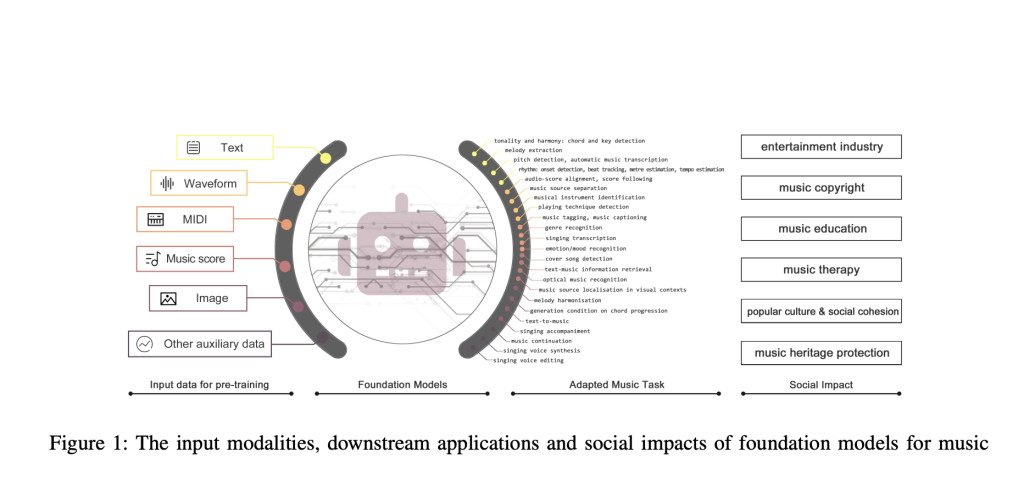Music information retrieval (MIR) has become increasingly vital as the digitalization of music has exploded. MIR involves the development of algorithms that can analyze and process music data to recognize patterns, classify genres, and even generate new music compositions. This multidisciplinary field blends elements of music theory, machine learning, and audio processing, aiming to create tools that can understand music in a meaningful way to humans and machines. The advancements in MIR are paving the way for more sophisticated music recommendation systems, automated music transcription, and innovative applications in the music industry.
A major challenge facing the MIR community is the need for standardized benchmarks and evaluation protocols. This lack of consistency makes it difficult for researchers to compare different models’ performances across various tasks. The diversity of music itself further exacerbates the problem—spanning multiple genres, cultures, and forms—making it nearly impossible to create a universal evaluation system that applies to all types of music. Without a unified framework, progress in the field is slow, as innovations cannot be reliably measured or compared, leading to a fragmented landscape where advancements in one area may not translate well to others.
Currently, MIR tasks are evaluated using a variety of datasets and metrics, each tailored to specific tasks such as music transcription, chord estimation, and melody extraction. However, these tools and benchmarks are often limited in scope and do not allow for comprehensive performance evaluations across different tasks. For instance, chord estimation and melody extraction might use completely different datasets and evaluation metrics, making it challenging to gauge a model’s overall effectiveness. Further, the tools used are typically designed for Western tonal music, leaving a gap in evaluating non-Western or folk music traditions. This fragmented approach has led to inconsistent results and a lack of clear direction in MIR research, hindering the development of more universal solutions.
To address these issues, researchers have introduced MARBLE, a novel benchmark that aims to standardize the evaluation of music audio representations across various hierarchical levels. MARBLE, developed by researchers from Queen Mary University of London and Carnegie Mellon University, seeks to provide a comprehensive framework for assessing music understanding models. This benchmark covers a wide range of tasks, from high-level genre classification and emotion recognition to more detailed tasks such as pitch tracking, beat tracking, and melody extraction. By categorizing these tasks into different levels of complexity, MARBLE allows for a more structured and consistent evaluation process, enabling researchers to compare models more effectively and to identify areas that require further improvement.
MARBLE’s methodology ensures that models are evaluated comprehensively and fairly across different tasks. The benchmark includes tasks that involve high-level descriptions, such as genre classification and music tagging, as well as more intricate tasks like pitch and beat tracking, melody extraction, and lyrics transcription. Furthermore, MARBLE incorporates performance-level tasks, such as ornament and technique detection, and acoustic-level tasks, including singer identification and instrument classification. This hierarchical approach addresses the diversity of music tasks and promotes consistency in evaluation, enabling a more accurate comparison of models. The benchmark also includes a unified protocol that standardizes the input and output formats for these tasks, further enhancing the reliability of the evaluations. Moreover, MARBLE’s comprehensive approach considers factors like robustness, safety, and alignment with human preferences, ensuring that the models are technically proficient and applicable in real-world scenarios.
The evaluation using the MARBLE benchmark highlighted the varied performance of the models across different tasks. The results indicated strong performance in genre classification and music tagging tasks, where the models showed consistent accuracy. However, the models faced challenges in more complex functions like pitch tracking and melody extraction, revealing areas where further refinement is needed. The results underscored the models’ effectiveness in certain aspects of music understanding while identifying gaps, particularly in handling diverse and non-Western musical contexts.
In conclusion, the introduction of the MARBLE benchmark represents a significant advancement in the field of music information retrieval. By providing a standardized and comprehensive evaluation framework, MARBLE addresses a critical gap in the field, enabling more consistent and reliable comparisons of music understanding models. This benchmark not only highlights the areas where current models excel but also identifies the challenges that need to be overcome to advance the state of music information retrieval. The work done by the researchers from Queen Mary University of London and Carnegie Mellon University paves the way for more robust and universally applicable music analysis tools, ultimately contributing to the evolution of the music industry in the digital age.
Check out the Paper. All credit for this research goes to the researchers of this project. Also, don’t forget to follow us on Twitter and join our Telegram Channel and LinkedIn Group. If you like our work, you will love our newsletter..
Don’t Forget to join our 50k+ ML SubReddit
Here is a highly recommended webinar from our sponsor: ‘Building Performant AI Applications with NVIDIA NIMs and Haystack’
The post This AI Paper Introduces MARBLE: A Comprehensive Benchmark for Music Information Retrieval appeared first on MarkTechPost.
Source: Read MoreÂ

